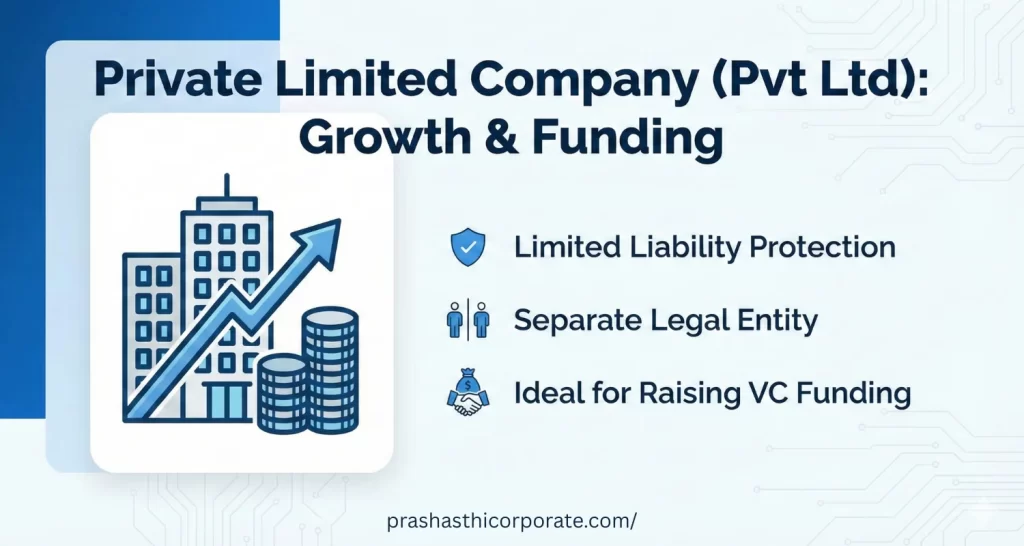Choosing the right business structure is one of the most confusing decisions for new founders. In fact, according to a survey by Inc42, nearly 64% of Indian startup founders admit they were unsure about the right type of company registration when they first launched. This uncertainty especially around the different types of company registration in India can lead to costly compliance issues, tax inefficiencies, and even missed funding opportunities.
Ramesh Prabhu, Chairman of the CA Association of India, notes that “Most early-stage entrepreneurs underestimate the long-term implications of their legal structure. What works as a sole proprietorship today might become a bottleneck when you approach VCs or want to expand.”
At Prashasthi Corporate Advisors, we’ve worked with over 100 founders to help them navigate this legal maze. One thing we’ve learned: There’s no universal answer. Your company registration should align with your business model, risk appetite, funding roadmap, and compliance capacity.
This guide will walk you through the different types of company registration in India, share expert insights, and help you choose the structure that sets your business up for long-term success.
Why Your Company Registration Type Matters?
Most first-time entrepreneurs don’t realize that their company structure can affect everything from day-to-day operations to long-term scalability. Your chosen structure governs your:
Liability protection
Taxation
Fundraising potential
Annual compliance requirements
Brand credibility
For instance, we recently worked with a Bangalore-based SaaS startup that started as a sole proprietorship to reduce initial costs. But within 18 months, their growth attracted angel investors. Their registration status became a roadblock to receiving the investment from their new Angel Investor. If they had started as a Private Limited Company, they’d have saved 3 months in restructuring and legal delays! Many founders also underestimate the total incorporation and compliance costs involved in different structures. Before deciding, it’s important to understand the actual company registration fees in India, including government fees, professional charges, and compliance costs
So let’s explore the options in detail, and let’s choose the right structure for your business!

Types of Company Registration in India (Complete Comparison)
1. Private Limited Company (Pvt Ltd)
Ideal for: Startups, growth-stage businesses, tech companies, businesses seeking funding.
A Private Limited Company is one of the most preferred company registration services in Bangalore and across India for good reason. It allows separate legal identity, limited liability, and credibility with investors.
Key Features:
Requires a minimum of 2 directors and 2 shareholders
Provides Limited liability protection
It forms a Separate legal entity from its owners.
You can easily transfer shares
Eligible for raising equity funding
A Pvt Ltd structure is not just about raising funds — it also signals long-term intent. Investors often look at it as a sign of seriousness and stability.
The Advisor’s Edge: This is the only structure that allows you to issue ESOPs (Employee Stock Option Plans). If you want to attract top-tier talent from companies like Google or Zomato by offering them equity, a Pvt Ltd is your only real option.
What are the Challenges with a Private Limited Business Structure?
Higher compliance and regulatory burden, which you can’t escape from.
Annual ROC filings and audits are mandatory, which adds up to a bit more expenses.
Choose pvt ltd company registration type if you are planning to scale, expand & secure investor funding.

2. Limited Liability Partnership (LLP)
LLP is ideal for Small and medium-sized service firms, consultants, and professional partnerships. There’s a growing inclination towards LLP company type due to its flexible features. According to Ministry of Corproate Affairs data, in 2023-24 alone, LLP registrations surged by 62.7% compared to previous year. There’s a noteworthy registration of more than 58,000 LLPs in India. You will learn the main reason for the favorability towards LLP here.
LLP combines the benefits of a partnership with limited liability protection. It’s a favorite for CA firms, legal consultants, and other professional services.
The Advisor’s Edge: LLPs offer a significant tax advantage on withdrawals. Unlike a Pvt Ltd where you pay Dividend Distribution Tax (DDT) to take money out, partners in an LLP can withdraw their share of profits tax-free once the firm has paid its flat 30% tax.
Key Features of LLP Business Structure
Requires a minimum of 2 partners
No requirement for minimum capital
Limited liability for all partners
Less compliance compared to Pvt Ltd
LLPs are often underutilized in India. For professional service firms that don’t need equity capital, it strikes the perfect balance between flexibility and protection.
Challenges of LLP Registration Type in India
Not ideal for raising equity capital
Slightly complex taxation if profits are high
Best suited if: You want legal protection but prefer ease of operations.
3. One Person Company (OPC)
OPC type of company registration is preferred for Solo entrepreneurs, freelancers, and consultants wanting a corporate structure. Since this business structure offers full control for a sole entrepreneur, India has seen a rise in the OPC incorporation since 2023. OPC offers a formal business recognition with no headache of managing multiple stakeholders.
OPC allows a single promoter to enjoy the benefits of a company with limited liability.
What Are The Key Features of OPC in India?
- You need only 1 director & 1 shareholder to incorporate the company. A director himself can be the shareholder.
- You will have limited liability protection.
- OPC is also a legal entity like a Private Limited.
- It has very less compliances to follow than a private limited company.
- If your annual turnover exceeds ₹2 Cr, you should convert OPC to Private Limited.
According to the Ministry of Corporate Affairs, OPC registrations have grown by over 40% in the last 3 years, reflecting their appeal among solo founders.
The Advisor’s Edge: While you are the “One Person,” the law requires you to name a Nominee during registration. This person only steps in if you are unable to manage the company. Pro-tip: Choose a trusted family member and ensure they have a valid PAN and Aadhaar ready.
What Are The Challenges of the OPC Business Structure?
- OPCc can’t raise equity funds or VC easily. Yet, we’ve seen many brands like Mamaearth that secured funding even after starting as an OPC.
- Restriction on turnover (Rs. 2 crore) and paid-up capital up to ₹50 Lakh only.
Best suited if: You’re a solo founder wanting structure and liability protection. If you’re considering this structure, understanding the OPC registration cost in Bangalore including government fees, DSC charges, and professional filing fees can help you plan your budget better.

4. Partnership Firm Registration
Partnership firms have been the backbone of Indian business. Traditional businesses or family-run operations with more than one owner.
A registered partnership firm provides operational flexibility but comes with shared liability.
Quick Features of a Partnership Firm
- Requires at least 2 partners to establish this business.
- Shared responsibility among the partners and profit sharing work based on the Partnership deed.
- Can be registered or unregistered with the MCA.
Why Some Still Prefer Partnerships Over LLPs?
Even with LLPs being safer and more structured, many micro-businesses and generational traders prefer partnerships because:
- Decision-making is quicker without formal resolutions.
- Mutual trust and shared control matter more than legal formality.
- The cost of converting to LLP or Pvt Ltd may seem unnecessary unless they plan to scale or raise funds
Over 60% of traditional small businesses and informal sector enterprises still operate as unregistered or registered partnership firms due to perceived simplicity, even if it limits their legal protections and growth.
– ICAI
Challenges of a Partnership Firm
- Partners have unlimited liability
- Less credibility than LLP or Pvt Ltd
Best suited if: You’re running a low-risk business with trusted partners, if you own family-run businesses, local retail shops or traders, or service professionals like advocates, doctors, accountants etc.,
5. Section 8 Company (Non-Profit Organization)
Section 8 type of business registration is ideal for NGOs, social enterprises, and non-profit organizations. Section 8 companies are meant for charitable objectives like education, environment, or social welfare.
What are the Key Features of Section 8 Companies?
- No minimum capital required to start this company in India.
- Can receive grants and donations from anywhere under the limitations of the Indian Constitution.
- Tax exemptions are available to the maximum extent.
- Regulated by the MCA and the Income Tax Department.
As per the Economic Times, donors and CSR wings prefer funding Section 8 companies over NGOs due to better governance standards. This also helps donors to build their reputation in the society.
The Advisor’s Edge: Registration is only half the battle. To actually attract donors, you must apply for 12A and 80G certifications immediately after incorporation. Without these, your donors won’t get tax deductions, and your NGO’s income won’t be tax-exempt.
Challenges of Section 8 Type Business Registration
- Cannot distribute profits
- Higher scrutiny and compliance
If you’re focused on social impact rather than profits, then section 8 is the ideal suggestion to get started with.
Need professional guidance? Prashasthi Corporate Advisors, offers expert assistance and personalized consultation to help you register your company with confidence.
How to Choose the Right Type of Company Registration in India?
Here’s an helpful quick decision guide based on real-world scenarios:
| Feature | Pvt Ltd Company | LLP | One Person Company |
| Best For | Startups seeking VC funding | Service firms & CAs | Solo founders |
| Compliance Level | High (AI-monitored) | Low (Flexible) | Moderate |
| Data Privacy | Strict DPDP Compliance | Standard | Standard |
| Taxation | 25% + Surcharge | Flat 30% | Same as Pvt Ltd |
| External Funding | Very Easy | Difficult | Minimal |
Still confused? The best company registration consultants in Bangalore often help with free consultations to evaluate your business type, funding goals, and legal protection needs.
Which Type of Company Registration is Best in India? (Expert Recommendation Guide)
There is no universal best company structure, it only depends on your goals, funding plans, risk appetite, and strategy. Based on our experience advising 100+ founders across Bangalore and India, here’s a practical decision guide to help you choose wisely.
- If you are planning to raise VC or angel funding? Private Limited Company is the best choice.
If you are running a consultancy or professional firm? LLP offers flexibility with lower compliance.
If you are starting solo and testing your idea? One Person Company (OPC) works well.
If you are running a small family or low-risk business? Registered Partnership may be sufficient.
If you are working for social impact or non-profit goals? Section 8 Company is the right structure.
Common Mistakes Founders Make When Choosing a Company Structure
- Choosing Sole Proprietorship for a High-Risk Business: No liability protection means your personal assets are at risk.
- Opting for OPC Without Knowing Growth Limits: OPC has turnover caps that can limit your scaling potential.
- Skipping Registration Altogether: Operating without legal recognition may result in lost opportunities and penalties.
- Registering a Partnership Instead of LLP: LLP gives better protection and credibility for similar efforts.
Final Words
When it comes to selecting from the various types of company registration in India, there’s no one-size-fits-all answer. The right choice depends on your vision, capital, risk tolerance, and growth plans.
For entrepreneurs in Bangalore, choosing the right structure with expert help can save time, reduce legal headaches, and unlock funding opportunities. Make sure you consult a trusted company registration service provider in Bangalore to start your journey on a strong legal footing.
Register Your Business in India With Us!
Related
Discover more from Prashasthi Corporate Advisors
Subscribe to get the latest posts sent to your email.





Pingback: Top 5 Company Registration Consultants in Bangalore
Pingback: How to Set Up Pvt Ltd Company in India? Simple Process | Prashasthi Corporate Advisors
Pingback: How to Choose the Right Company Structure For Your Business?
Pingback: Ways Corporate Advisors Make It Profitable for MSMEs
Pingback: Bookkeeping vs Accounting: Key Differences, Roles & 2025 Guide
Pingback: OPC Registration in Bangalore (2025) | Complete Cost Breakdown
Pingback: How to Apply for PF Registration Online – EPFO Step-by-Step Guide 2026
Pingback: LLP vs. Partnership Firm: Which Is Better for Small Businesses in India?
Pingback: How to Convert a Sole Proprietorship into a Private Limited Company?
Pingback: OPC Company Registration vs Sole Proprietorship (2026 Guide)